ISLAMABAD: A one-man inquiry commission appointed by the Supreme Court has regretted that quality of drinking water in Sindh has gone from bad to worse as the provincial government has not managed to bring about any improvements in this regard.
The commission comprising Justice Muhammad Iqbal Kalhoro of the Sindh High Court submitted a report on the matter to the Supreme Court on July 14, which was taken up by the court’s three-member bench headed by Justice Mushir Alam on Sept 7.
Later, the bench decided to make the report public and requested Chief Justice Mian Saqib Nisar to set up a special bench to hear the matter because it involved examining the voluminous report thoroughly.
The commission’s report said that 78.1 per cent of the water samples were found to be unsafe for drinking. The condition of water filtration plants had also not improved and in only one or two cases some rudimentary repair work had started.
Referring to the situation in Karachi, the commission recalled that it had recommended immediate acquisition of new sources of water supply — like the 260MGD K-IV project — that would help overcome shortage in the metropolis that receives 650MGD (million gallons per day) against a demand of 1,100MGD. Likewise, an enhancement in water quota for the provincial capital had been proposed.
But nothing concrete had been done so far and no programme had been launched to check unauthorised urbanisation in major cities to keep the water requirement under control, the commission said in its report.
The situation in the areas devoid of water distribution system had not changed because no work had been carried out to lay distribution lines in such areas. Also, nothing concrete had so far been done to replace the existing poor and faulty water supply infrastructure to reduce water shortage and contamination.
Though the provincial government had claimed that a bulk of purchasers in Karachi had been subjected to a metering system, no tangible evidence in this regard had been produced and it was not explained as to how the system was working, what was the basic unit of water being sold, what was the cost per such unit, and so on.
The commission regretted that no concrete progress had been made to replace the manual water distribution system. Therefore it was not possible to check water theft, puncturing of water lines and running of illegal water hydrants, except through a modern system based on computer technology.
The report said that Sindh government had not made clear its intention to install new filtration plants to overcome current and future deficiencies in the sector. Nothing substantial had been done by the government to remove encroachments from the Effluent Treatment Plant-II, Mehmoodabad, Karachi, despite the order of the Supreme Court.
The Sindh Environmental Protection Agency (Sepa) had also ostensibly failed to stop contamination of coastal water of Karachi which was being degraded due to constant discharge into it of untreated industrial effluent.
The report regretted that no tangible progress had been made yet by the provincial government to provide potable water to the public offices, including schools and hospitals. And nothing had been done to improve sanitation at all these places.
Published in Dawn, September 18th, 2017















































